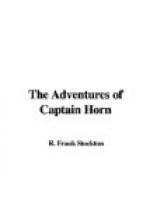He told her that her son had died far away in South America, and, from what he had gained there, one hundred and four pounds a year would be coming to her, and that she might rely on this as long as she lived. He did not state—for he was not acquainted with all the facts—that Shirley and Burke, when they were in San Francisco hunting up the heirs of the Castor’s crew, had come upon traces of the A. McLeish whose body they had found in the desert, lying flat on its back, with a bag of gold clasped to its breast—that they had discovered, by means of the agent through whom McLeish had been in the habit of forwarding money to his mother, the address of the old woman, and, without saying anything to Captain Horn, they had determined to do something for her.
The fact that they had profited by the gold her son had carried away from the cave, was the main reason for this resolution, and although, as Shirley said, it might appear that the Scotch sailor was a thief, it was true, after all, he had as much right to a part of the gold he had taken as Captain Horn could have. Therefore, as they had possessed themselves of his treasure, they thought it but right that they should provide for his mother. So they bought an annuity for her in Edinburgh, thinking this better than sending her the total amount which they considered to be her share, not knowing what manner of woman she might be, and they arranged that an agent should be sent to look her up, and announce to her her good fortune. It had taken a long time to attend to all these matters, and it was now late in the autumn.
“You must not stand out in the rain, Mrs. McLeish,” said one of the men, and he urged her to come back into the hut. He said he would build a fire for her, and she and the gentleman from Edinburgh could sit down and talk over matters. No doubt there would be some money in hand, he said, out of which the rent could be paid, and, even if this should not be the case, he knew the landlord would be willing to wait a little under the circumstances.
“Is there money in hand for me?” asked the old woman.
“Yes,” said the traveller. “The annuity was to begin with October, and it is now the first of November, so there is eight pounds due to you.”
“Eight pounds!” she exclaimed, after a moment’s thought. “It must be more than that. There’s thirty-one days in October!”
“That’s all right, Mrs. McLeish,” said the traveller. “I will pay you the right amount. But I really think you had better come into your house, for it is going to be a bad afternoon, and I must get away as soon as I can. I will go, as I came, in the cart, for you won’t want it now.”




